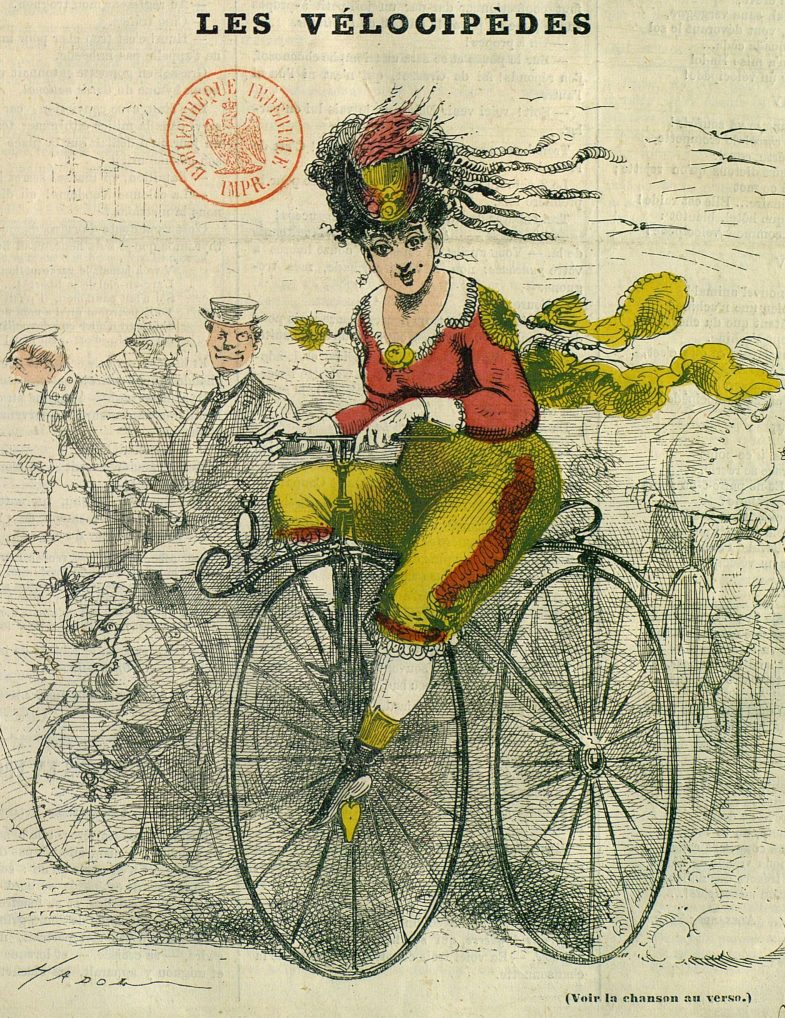Velocipedomania: A Cultural History of the Velocipede in France is a collection that foregrounds the significance of the nineteenth-century French invention that later developed into the modern bicycle. Edited by Corry Cropper, professor of French at Brigham Young University, and Seth Whidden, professor of French literature, Queen’s College, Oxford, the book includes three original source texts translated from French—available for the first time together in English—that explore the cultural significance of the velocipede. This engaging volume explores how the new machine represented cutting-edge technology and gives readers a glimpse into the material culture of France in the late 1860s, while underscoring the machine’s importance to the study of gender, culture, and the history of sport.
Here we speak to the editors about class mobility, transportation, and translation:
Why were you both drawn to studying the velocipede and its parallels to French culture?
Both of us enjoy cycling—in fact we have cycled together before—so this was a topic that ticked all the boxes for us in terms of our scholarly focus on nineteenth-century France and our interest in the sport.
Throughout the text, you argue that the velocipede becomes a “symbol for economic mobility” that creates a “sense of middle-class national solidarity” (24-25). Can you explain how the wooden wheeled machine became such a symbol, particularly during late Second Empire in France?
The velocipede amazed people because it was new and different. Seeing people zipping around under their own power on two wheels without touching the ground attracted attention. And since the velocipede was a French invention, it served as a source of pride for the entire country. Its very existence implied progress, energy, freedom, and inventiveness. Initially, riding was primarily an upper class hobby, but the velocipede quickly became ubiquitous in Paris and inspired people of different classes to ride. More physical mobility also held the promise of more social mobility: people who couldn’t afford a horse suddenly saw new opportunities.
Would you call the velocipede a modern form of transportation?
We would call it the modern form of transportation. Besides the railroad, no form of transportation changed life more in France than the velocipede and its descendant the bicycle. In fact, it could be argued that globally the bicycle remains the most important form of transportation ever invented; it provides mobility for people from every socioeconomic level in nearly every region on the planet.
Can you speak to the experience of translating Note on Monsieur Michaux’s Velocipede and the Manual of the Velocipede compared to the operetta Dagobert and His Velocipede?1 While both texts emphasize the influence of the velocipede in French culture, do the different genres communicate that influence to varying extents?
The Note is more technical in nature, and the original author was more a bureaucrat than a writer. So we found it challenging to translate. But it remains an important piece because it argues for the utility of the velocipede. The operetta, Dagobert and His Velocipede, appeals to a popular audience and is designed to entertain. Since the action is set in the Middle Ages, the velocipede becomes a source of anachronistic humor: we had great fun working on it. The Manual of the Velocipede straddles the two: it features some practical advice alongside arguments in favor of the velocipede’s usefulness, and it ties the velocipede into French history, French literature, and the tradition of gallic humor.
In the introduction, you note Timothée Trimm’s front-page article in Le Petit Journal (July 5, 1868) and his greatest fear that “the velocipede will damage France’s literary reputation” (7). As French professors (as well as translators of these texts), did Trimm’s fear have any merit?
Not really. But it does highlight the fear people have around any new technology while also implying that one of the most central aspects of French identity and pride in the late 1860s was their literary tradition. It might be comparable to an American journalist being afraid that TikTok would destroy Hollywood and the American cinematic tradition.
While your book addresses this question in detail, why, briefly, was the enthusiasm for the velocipede so short-lived?
The main company that manufactured and promoted the velocipede suffered from infighting and financial problems. Then in 1870, France was lured into a devastating war against Prussia, and in 1871 there was a bloody civil war known as the Paris Commune. All this taken together spelled the end of the fervor for the velocipede in France2. But the cultural forms created around the velocipede would help shape how the bicycle was perceived later in the century.
Velocipedomania features forty black and white and six color images, including a number of illustrations of the velocipede that originally appeared in newspapers, musical scores, manuals, and advertisements from the 1860s. It is available for order in paperback, hardback, and ebook.


